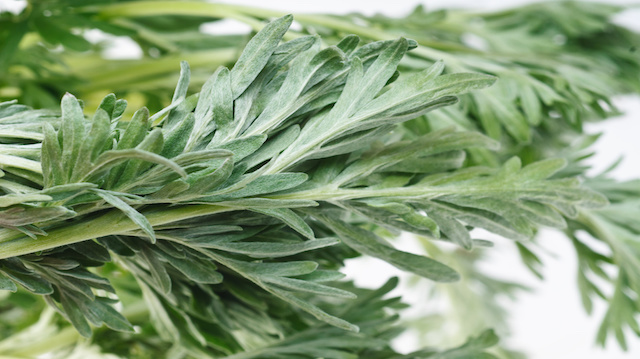Wormwood is an herbaceous shrub native to Europe, North Africa and Asia. It is also cultivated in North America and is often used in landscaping for its pleasing aroma and yellow blossoms. Although it smells nice, wormwood tastes very bitter, which is likely a result of all the medicinal compounds contained within it. The Latin word absinthial means bitter, and the Latin name for wormwood is Artemisia absinthium. The liquor absinthe was named as such because wormwood was traditionally used in its preparation. In fact, it appears that wormwood is responsible for the psychoactive effects of this now largely banned alcoholic drink. It was discovered that wormwood contains toxins similar in structure to tetrahydrocannabinol or THC, the active ingredient in marijuana.
When wormwood is used in a less concentrated form, however, it is perfectly safe and even beneficial. Traditional uses include helping with menstrual pains and preventing the occurrence of anemia, jaundice and rheumatism. We have outlined some of its modern therapeutic applications below.
Benefits of wormwood as an herbal remedy
One of the most common uses for wormwood is as an antiparasitic agent. It is known to help with the expulsion of intestinal worms, such as pinworms and roundworms. Since it is effective against parasites, it can also be used as a natural insect and pest repellent in the garden, or it can be applied to pets. To prevent moth and flea infestations, the dried herb can be added to storage containers packed with textiles.
In addition, wormwood is said to support the function of a number of organs. Its ability to reduce inflammation is useful in treating problems with the gall bladder, stomach and liver. Wormwood is used to treat jaundice, hepatitis and fever, a practice that dates back hundreds of years. It is believed that the application of wormwood extract can also act as a preventative agent, protecting the liver from damage.
The bitter, medicinal components of wormwood stimulate bile production when they come into contact with the tongue, which could be why the herb makes such a good digestive tonic. These properties are shared with other plants in the Artemisia family, such as tarragon.
 Wormwood
also has mood-regulating effects. Some herbalists believe it to be
effective in treating mild cases of depression and in stimulating sexual
desire and motivation.
Wormwood
also has mood-regulating effects. Some herbalists believe it to be
effective in treating mild cases of depression and in stimulating sexual
desire and motivation.A wide range of aches and pains can benefit from the application of wormwood essential oil, including muscle sprains, joint inflammation and arthritis.
How to buy and use wormwood as an herbal remedy
Wormwood can usually be found as an extract or essential oil, which is green or blue in color and has a strong bitter smell. It is made from all components of the plant, i.e. the root, stem, leaves and flower.
The extract of wormwood is often used in combination with other herbs. For example, a concoction made with wormwood extract, peppermint oil and caraway extract can be used as a digestive remedy to treat heartburn and irritable bowel syndrome.
Another effective way to use wormwood is to make a tea from the dried leaves. Simply mix one ounce of dried leaves into one pint of boiling water and allow to steep, covered, for ten minutes. This gentle tonic removes most of the volatile oils and is largely nontoxic, although long-term use of any form of wormwood is not recommended.Thinking of using wormwood to get rid of a parasite? To find out more, read this article: 4 Weird Signs That You Have a Parasite.
—The Alternative Daily
No comments:
Post a Comment